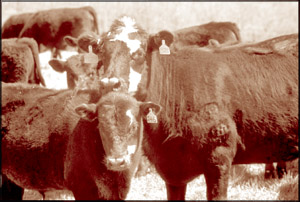
Electricity from cows!
When the Audet family turns on the lights at Blue Spruce Farm in
Bridport, Vermont, they are using electricity that comes from cows - cow
manure, to be specific.
Cows produce a lot of manure. One cow can create an incredible 30
gallons (114 litres) of manure each day. Now imagine the output of over
1000 cows at Blue Spruce Farm. That's one big pile of cow pies.
When farmers clean their barns, they put the manure in a big heap,
and spread some of the stuff on their fields for fertiliser.
|

One cow can create an incredible 30 gallons (114 litres) of
manure each day. |
But now places like Blue Spruce Farm have a new way of handling cow
manure. They use it to make electricity.
Here's how it works: A big scooper moves back and forth cleaning the
barn floor. The cows aren't bothered, says Marie Audet. "They are
creatures of habit; they get used to it, and just lift one foot and then
another to let it go by."
The scooper pushes the manure into a big 600-gallon (2,268 litres)
concrete tank like a swimming pool. The tank is called a digester
because what happens there is just like what happens inside a cow:
Bacteria get to work and continue to digest the manure.
Methane gas in the atmosphere is known as a "greenhouse" gas because
it traps heat just like a greenhouse does, causing our planet to warm
up. That's an environmental concern. But the digester process has a
positive outcome.
The gas is captured and used as fuel to power electric generators.At
Blue Spruce Farm, the generators make enough electricity to power 400
homes. The Audet family sells the extra electricity they can't use
themselves.
Manure that has been in the digester for three weeks gets pushed out
to make room for the next batch. Then a machine squishes the liquid out
of it.
"The liquid is used to fertilize the fields, and it doesn't smell at
all," says Mrs. Audet. And, while it might sound unusual, the dried
solids make fluffy, odour-free bedding for the cows.
"We used to have to buy a tractor-trailer load of sawdust every week
for cow bedding," says Mrs. Audet. That's $1,200 they don't have to
spend any more.
National Geographic Kids News
|
